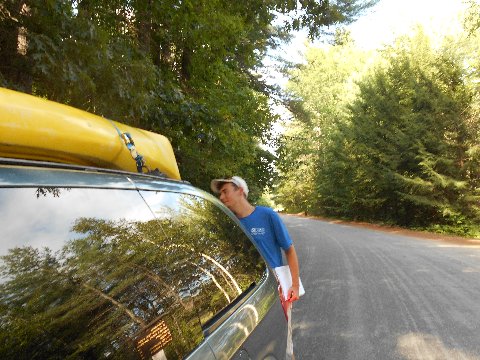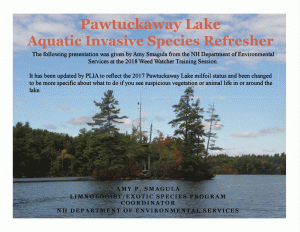 The NH LAKES’ Lake Host™ Program is a courtesy boat inspection and public education program whose goal is to prevent the introduction and spread of aquatic invasive species. Amy Smagula of the NH Department of Environmental Services created an excellent and comprehensive slideshow to train Lake Hosts. You can view it yourself, here. Administered by NH LAKES, PLIA volunteers and trained personnel work diligently to identify and remove foreign “hitchhikers” from boats and trailers before they enter the waters of Pawtuckaway Lake and spread. The lake has a number of public boat access points, including the Fundy Boat Launch and through the State Park.
The NH LAKES’ Lake Host™ Program is a courtesy boat inspection and public education program whose goal is to prevent the introduction and spread of aquatic invasive species. Amy Smagula of the NH Department of Environmental Services created an excellent and comprehensive slideshow to train Lake Hosts. You can view it yourself, here. Administered by NH LAKES, PLIA volunteers and trained personnel work diligently to identify and remove foreign “hitchhikers” from boats and trailers before they enter the waters of Pawtuckaway Lake and spread. The lake has a number of public boat access points, including the Fundy Boat Launch and through the State Park.
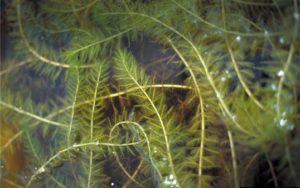
Invasive aquatic species like variable milfoil, zebra mussels, and water chestnut plants cling to boats and trailers and are often spread unknowingly from lake to lake. Invasive aquatic infestations in lakes and ponds are undesirable because they make recreation in and on the water dangerous and unpleasant, disrupt the ecological balance of these water bodies, reduce shoreline property values, and are difficult and expensive to control.
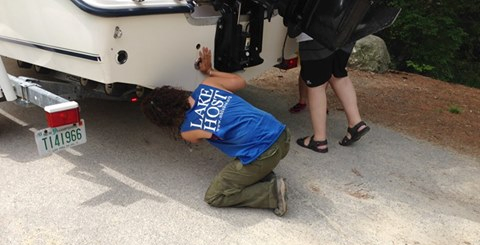 PLIA Lake Hosts, armed with pamphlets and information, greet boaters at various public boat access points around the lake and offer to inspect incoming boats, trailers, and equipment, as well as to demonstrate techniques for proper cleaning of boating equipment. As of 2016, Lake Hosts are also greeting campers and visitors arriving with watercraft at the State Park. The diagram below indicates the many points where invasive “hitchhikers” may lurk. The most effective way of eliminating this hazard is to follow these “Clean, Drain, and Dry” instructions recommended by NH LAKES:
PLIA Lake Hosts, armed with pamphlets and information, greet boaters at various public boat access points around the lake and offer to inspect incoming boats, trailers, and equipment, as well as to demonstrate techniques for proper cleaning of boating equipment. As of 2016, Lake Hosts are also greeting campers and visitors arriving with watercraft at the State Park. The diagram below indicates the many points where invasive “hitchhikers” may lurk. The most effective way of eliminating this hazard is to follow these “Clean, Drain, and Dry” instructions recommended by NH LAKES:
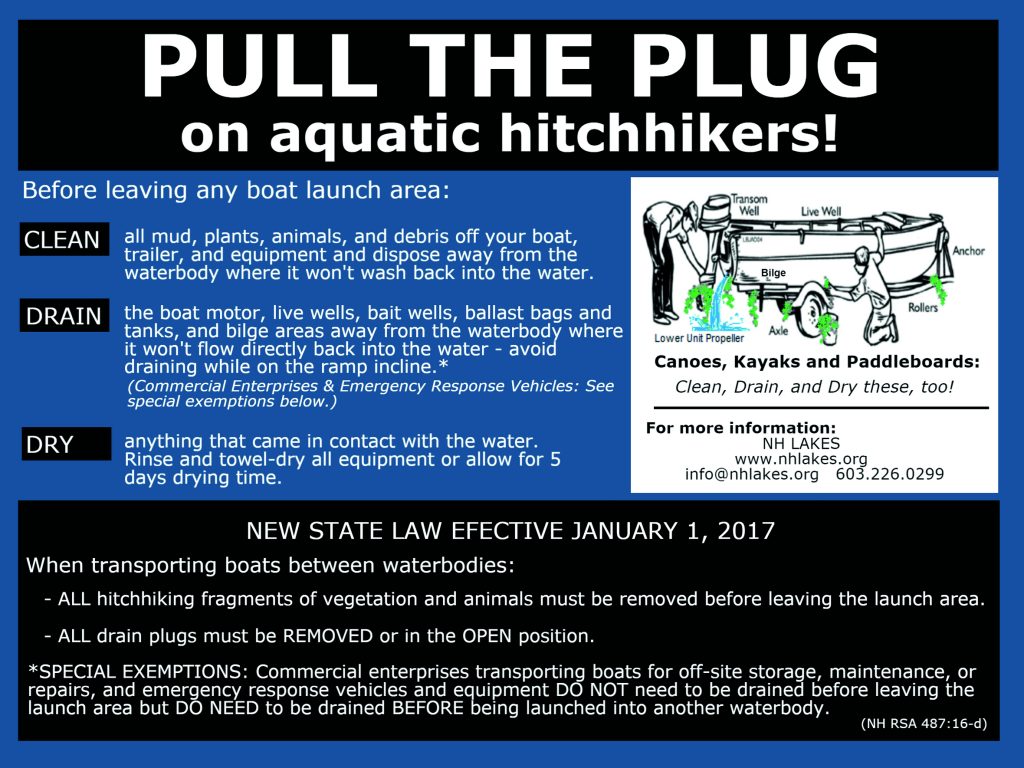
- Clean
Before boating and before leaving the launch, remove all visible plants, animals, mud, and other debris from your boat, trailer, and other recreational gear, and dispose of it in a trash container. Inspect all live wells, fishing gear, and anchor. Cleaning is the law! - Drain
After boating and before leaving the launch, drain water from bilge, live wells, ballast tanks or bags, fishing gear, and bait buckets. Keep all drain plugs open/out while trailering between waterbodies. Make sure to put drain plugs back in before launching again. Draining is the law! - Dry
Before boating again, dry the boat, trailer, and other equipment and recreational gear that has come in contact with water. At least five days of drying time is recommended. And, if possible, rinse your boat and gear off after every use – the hotter and higher the pressure of the water, the better. Ensure that rinse water does not enter surface waters. (Commercial hot water car washes work well.)
Here’s what Lake Hosts are instructed to do in performing their inspections–you should practice this on your own boats: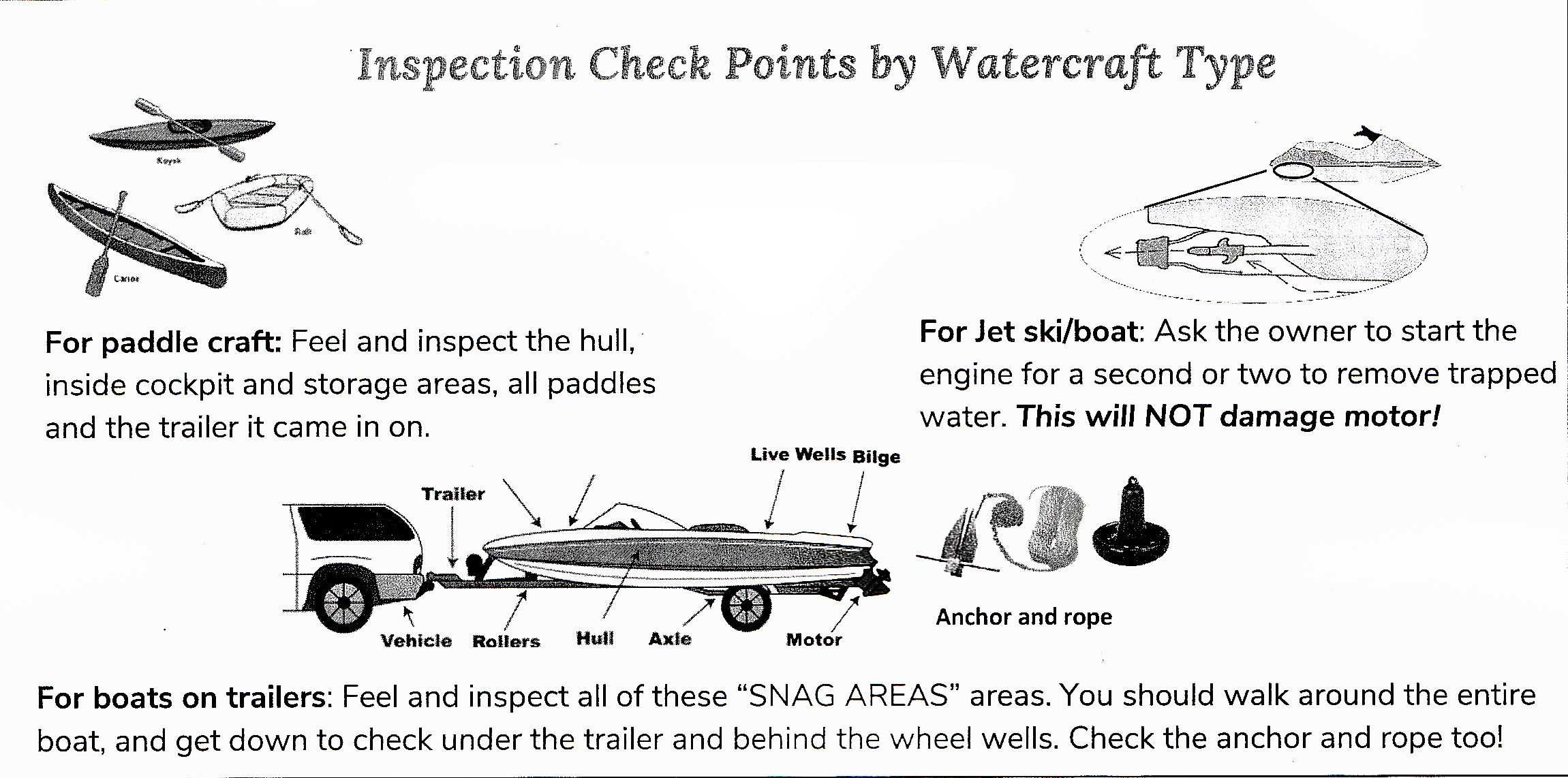
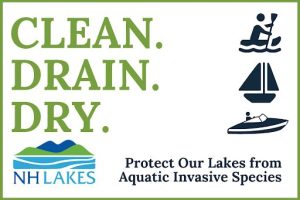
Effective January 1, 2017, two important new laws went into effect in New Hampshire to prevent additional aquatic invasive species infestations (RSA 487:16-c and 487:16-d). Specifically, the laws prohibit the transport of any aquatic plants on recreational gear and related trailers and require that boats and other water-containing devices be in the open-drain position during transportation. Violators could face fines ranging from $50 – $200. These laws are enforced by the New Hampshire Marine Patrol, conservation officers, and other peace officers.
Over the years of our program, Lake Hosts have identified and removed many invasive aquatic species found clinging to visiting boats and trailers at public boat launches, and have offered countless hours of education to the public about the dangers of aquatic invasives, techniques for keeping their boating equipment clean and pest-free, and new laws affecting the transport of aquatic species on boating equipment.
On Pawtuckaway, our Lake Host program is funded by several sources. The PLIA contributes funds, the Town of Nottingham—at the approval of voters—provides funding, and grant money comes through the NH Lakes Association. This grant money must be matched at 300% through volunteer hours provided by PLIA members. Volunteer hours include overall program management, as well as training, supervision, and coordination of workers and volunteers.
Constant vigilance and volunteer spirit are key to preventing Pawtuckaway Lake from being choked by invading aquatic species. In the past, many “finds” have resulted in rescues that have kept the lake safe from invasion. However, in the late summer of 2015, Variable Milfoil was discovered growing in the water near the State Park Horse Island boat ramp. Since then, additional infestations around the lake have been discovered. An eradication plan that was implemented throughout the boating season of 2016 continues through the present. Strategies are being developed to manage all milfoil growths in the lake, including the formation of a Milfoil Team. Whether eradication efforts prove effective remains to be seen, but spreading infestations underscore the need for funding additional hours of boat and trailer inspections at the State Park. We don’t want Pawtuckaway Lake to look like this:
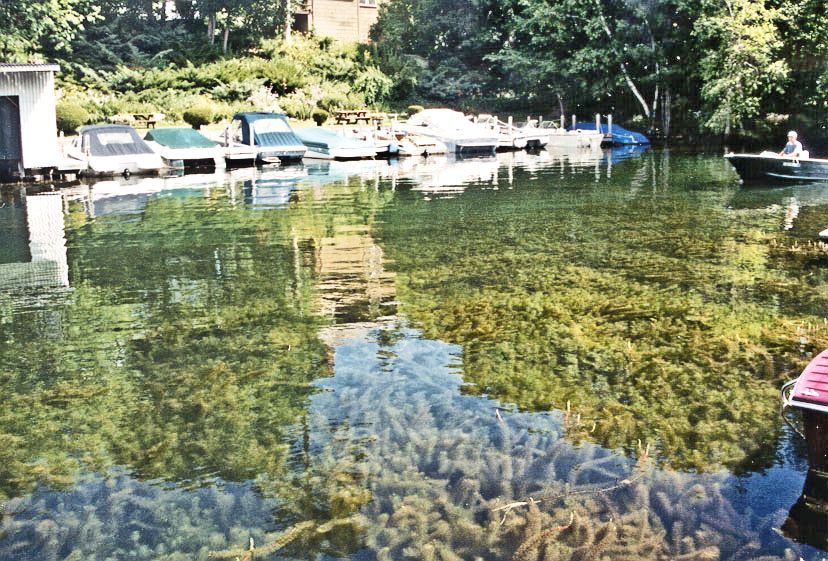
You can be a part of this crucial program of the PLIA. Find out about trainings and volunteer opportunities by sending an email with your contact information, along with how you would like to help, to Info@PawtuckawayLake.com. We will also be happy to answer any questions you may have. If you are unable to volunteer but would like to make a donation to the Pawtuckaway Lake program you can use the NH Lakes Lake Host Charitable Giving link. When you choose Pawtuckaway Lake Improvement your contribution goes directly to us for our paid Lake Host payroll.The lake will thank you!
